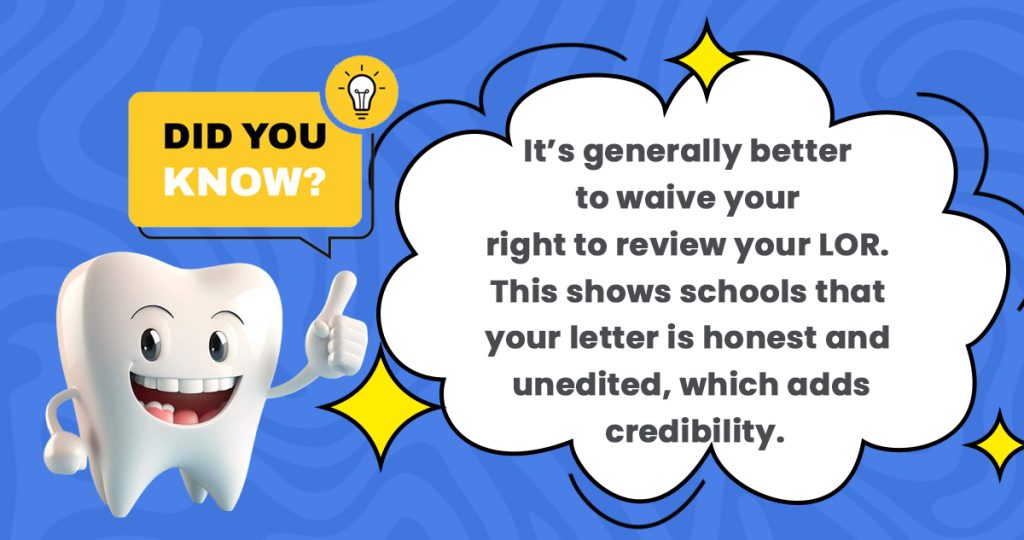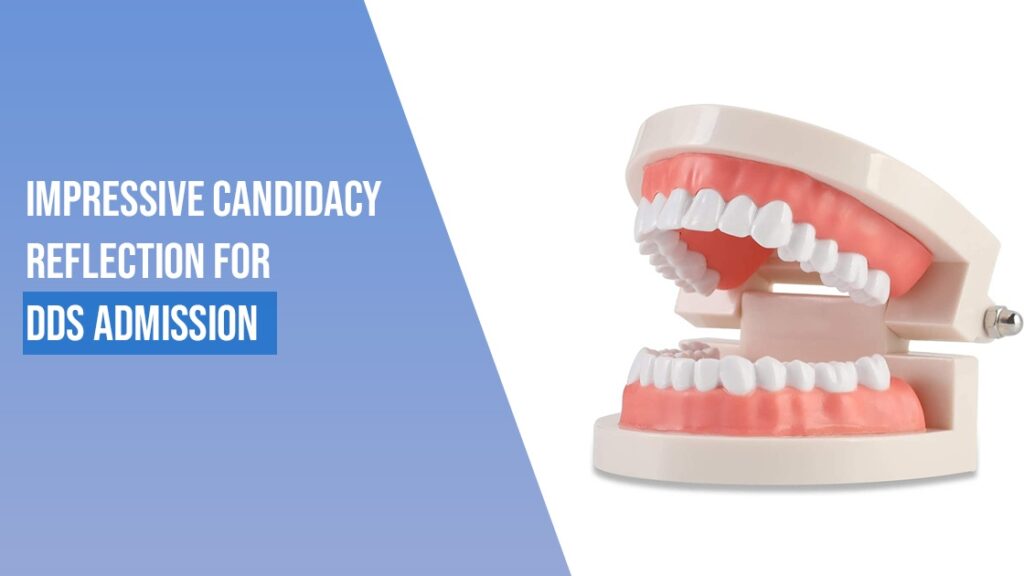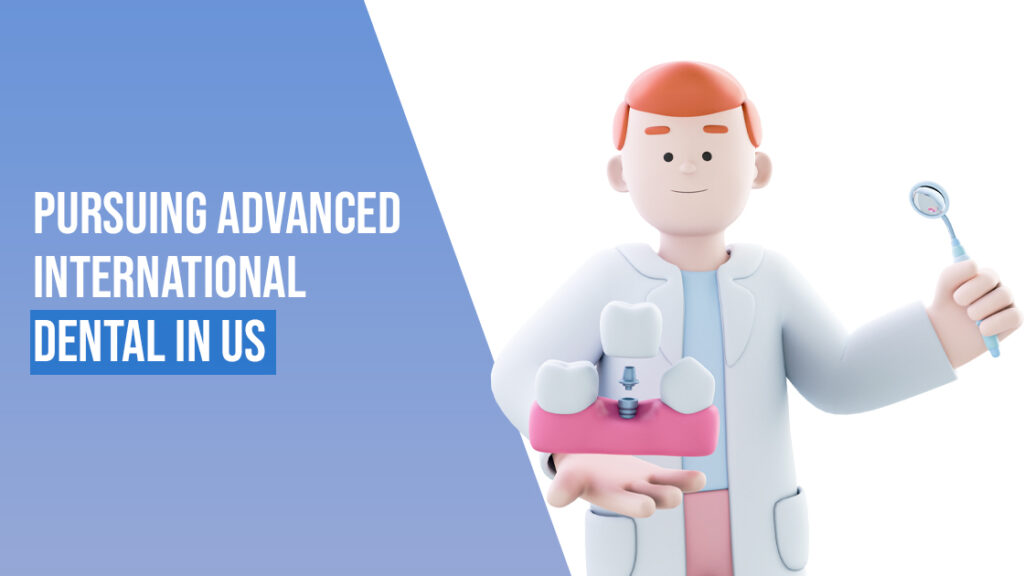Hi Applicants!
You’ve taken your first real step toward making that dream come true, and that’s something to be proud of. Now, entering the world of CAAPID isn’t like sprinting a 100-meter dash. It is not even a marathon. It is more like preparing for an expedition to Mount Everest. The climb itself might look straightforward on paper, but the preparation? That’s where the real effort lies. One of the first things to check off your preparation list is something many overlook until the last moment: Letters of Recommendation.
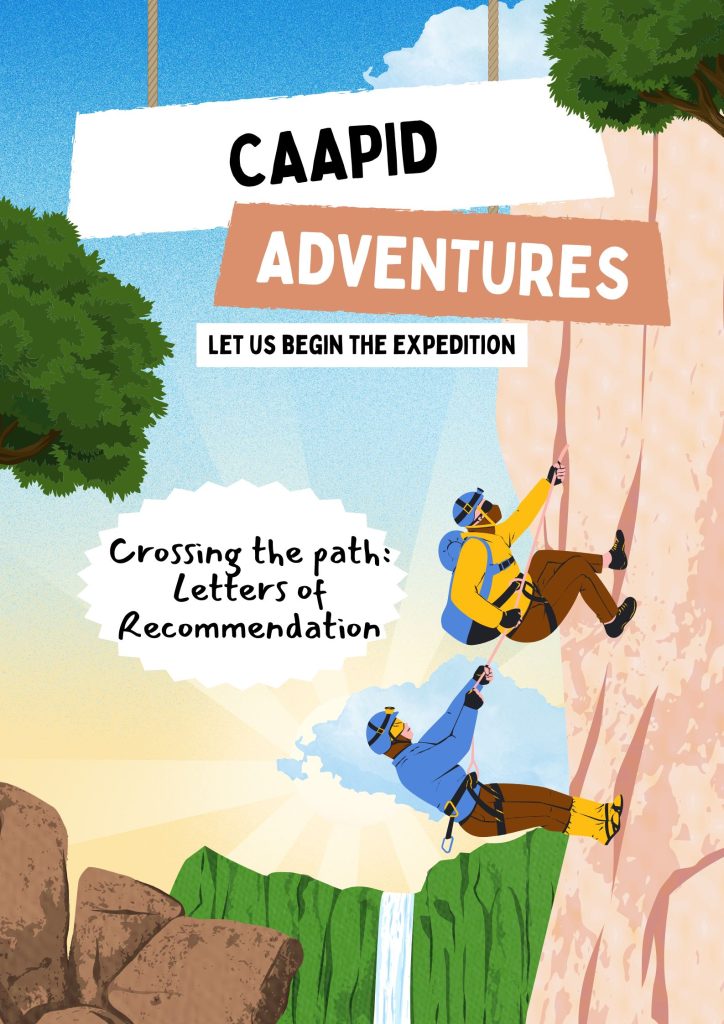
So, who should you ask? Choosing your recommenders isn’t just about picking people with fancy titles. It’s about selecting those who know your journey, your growth, and your dedication.
CAAPID asks for three mandatory recommendation letters. Before discussing the choice of recommenders, it is important to understand the need for a Letter of Recommendation. The schools know what you’ve done through your CV and the impact that you’ve made? That’s where the LOR comes into play. The purpose of any LOR is to assess whether you’ll fit into a dental school.
Frequently Asked Questions about LORs
- I am trying to apply to NYU, and the set of requirements for LORs is different compared to other colleges; they need all three LORs from college, but other colleges might prefer one LOR from a dentist in the US.
A: While NYU does ask for three from dental school (1 dean + 2 professors), it has historically accepted the dean+professor+US Dentist combo. We have heard that applicants are having their recommenders email NYU directly.
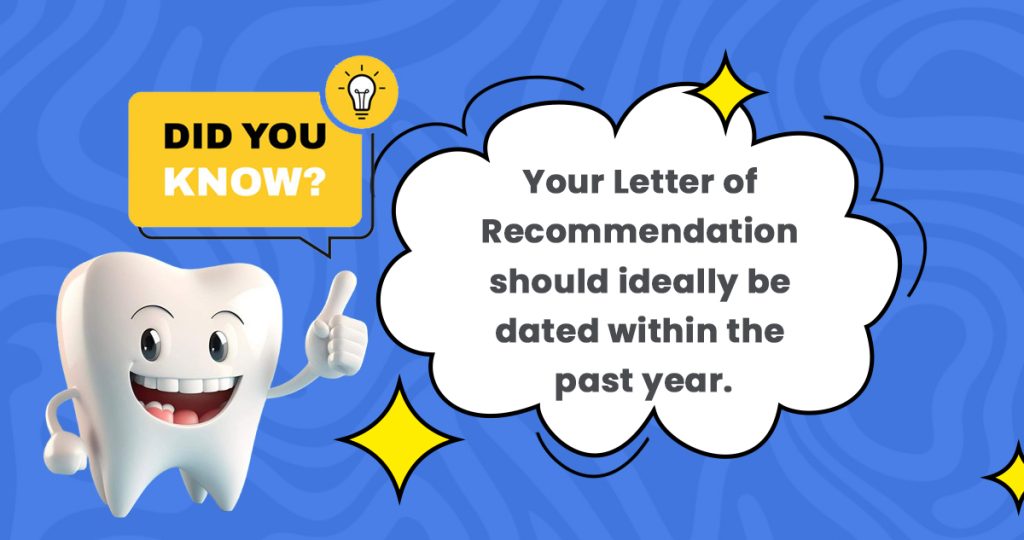
Dean’s Letter
- What if the Dean’s not in the picture at all? Or if the school has permanently closed? Can I speak with the Dean of my Master’s program?
A: If you have pursued a Master’s degree, you can get it from that program’s Dean.
However, based on our observations, a BDS Dean’s letter is generally preferred and is asked to attest to your candidature in the school. It acts as proof that you were indeed a student during the said period and that you’ve completed your coursework and degree.
If you’re unable to provide precisely what ADEA asks for, make sure to email the school and explain the situation. It’s always better to clarify than to skip it.
- What if the Dean is working at a different place now?
A: You can get the dental school letter of recommendation from them using their current letterhead. Ensure the letter mentions their tenure at your dental school, your relationship with them, and how they know you in the introduction of the letter of recommendation (LOR).
- If I can get the current Dean’s letter, should I?
A: Yes, if it’s possible to get the current Dean’s letter on the school’s official letterhead, go for it. That helps with verification and official documentation. If your former Dean knows you well and can highlight your academic and clinical strengths, make that your additional letter. A letterhead doesn’t just carry a name but reflects the institution’s endorsement.
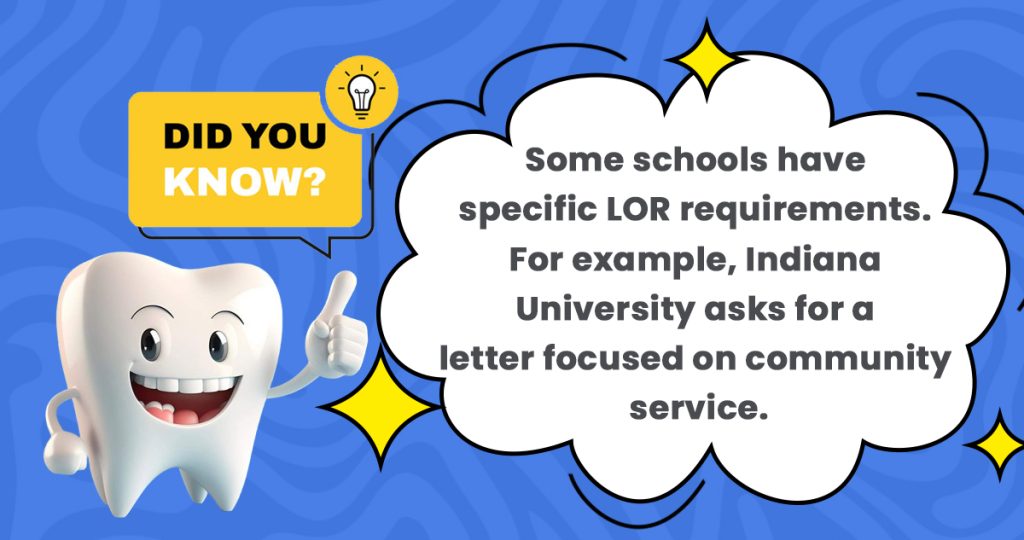
- Should I get the BDS Dean’s or the MDS Dean’s letter?
A: Schools usually prefer the BDS Dean. Again, it comes down to why a school needs a particular letter. The Dean from your bachelor’s degree can confirm that you were a student who completed the degree within the specified time frame.
- Dean vs. Principal?
A: Titles can vary depending on the institution. If your school only has a Principal, it’s perfectly acceptable to get their letter of recommendation. But if both roles exist, you can go with the Dean’s letter.
- Should there be a college seal?
A: Not mandatory. The must-haves are the signature, date, and letterhead.
- New Dean vs. Old Dean? Who should be your recommender, and what should be done if one of them is unavailable?
As we mentioned earlier, the Dean’s LOR is primarily used to confirm your enrollment and completion of the program.
If the new Dean is available, their letter is often preferred because it can come on the official school letterhead. It includes the current seal and designation, which makes verification easier for schools.
However, if your former Dean knows you well, has been your professor, or has a good rapport and can genuinely speak to your academic and clinical skills, their letter can be a valuable second recommendation. It’s a good balance- official validation from one and personal insight from the other.
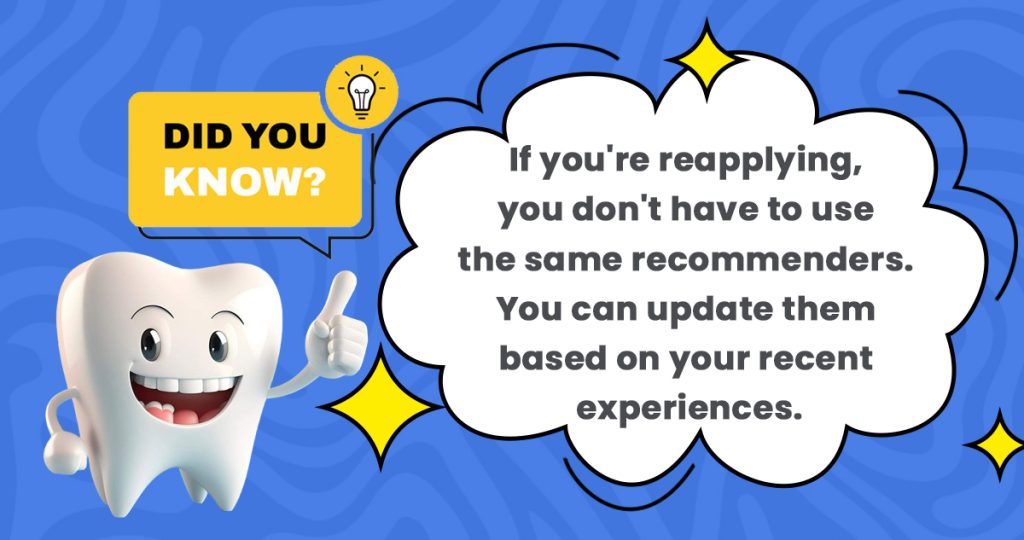
Professor’s Letter
Now, let’s go over some common questions that come up when choosing your second letter, your dental school professor’s recommendation.
- BDS Professor Vs. MDS Professor?
A: Schools universally accept the BDS professor’s letter. An MDS professor’s letter works too, especially if you want to highlight your thesis, research, or clinical experience. One thing to keep in mind is that a professor’s letter is to substantiate your clinical and academic skills.
- Which professor should I choose? Can I ask my Public Health professor?
A: It is ideal to choose a professor who can speak to your clinical skills, such as someone from the departments of Endodontics, Oral Surgery, Prosthodontics, etc. A Public Health professor might not be the best fit unless they have clinical involvement with you.
Also, choose someone who knows you well. A strong rapport often leads to a stronger, more personal letter.
- What if my former professor is now the current Dean?
A: That works out perfectly. They can write a letter that covers both your academic and clinical strengths.
- What if my professor no longer works at my school?
A: That’s absolutely fine. They can write the letter on their current organization’s letterhead. Just make sure they mention their time at your school and how they know you in the opening lines of the letter.
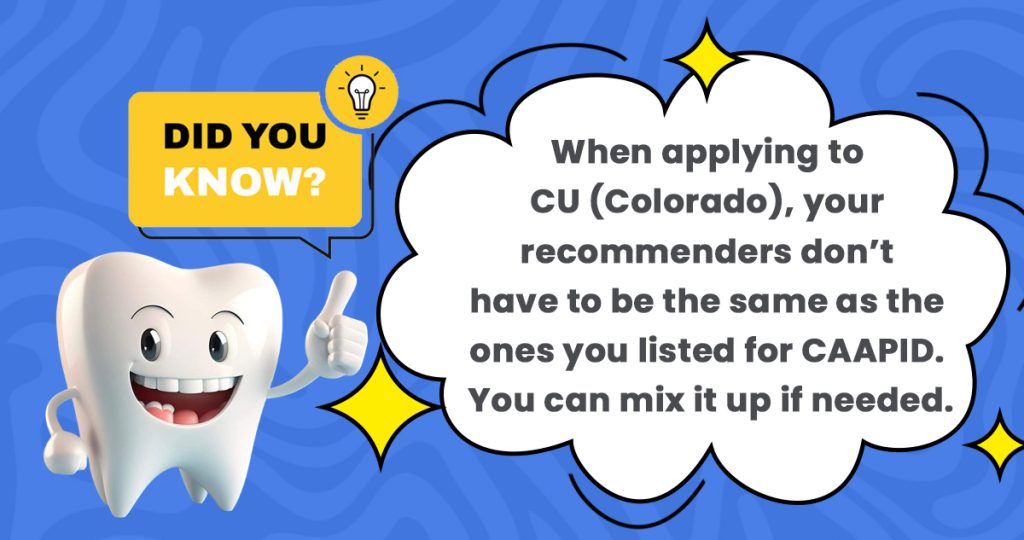
Dentist’s letter
Why does a dental school need a dentist’s letter of recommendation? This is how they get a glimpse into your real-world experience, including how you interact with patients, handle day-to-day situations, and carry yourself in a clinical setting. It helps them understand your approach to patient care, your professionalism, and your readiness for hands-on dentistry.
- I shadowed a dentist in the U.S. for a month—should I use their letter? They barely know me. Can I list it as my fourth or fifth letter of recommendation?
A: There’s no strict blueprint here. You can go ahead and use it as your third letter if needed. Many schools specifically ask for a U.S. dentist’s recommendation. The extent of exposure matters, but so does what you’ve learned. Any U.S dental experience is significant. If you’ve been shadowing consistently for a month, that still shows effort and exposure, and that counts.
- U.S. dentist Vs. Indian dentist?
A: There is no thumb rule here. It also depends on the school’s requirements. Address this based on the following:
- Your tenure at the said clinic.
- How well does the dentist know you?
- School-specific requirements.
- That said, if you’ve shadowed or assisted a dentist in the U.S., that usually takes priority. Schools value local clinical exposure, so a U.S. dentist’s letter can carry more weight in those cases.
- Specialist Vs. General dentist? Whose letter should I choose?
A: Go with the one who knows you better and can genuinely speak to your skills. Whether they’re a specialist or a general dentist doesn’t matter as much as the quality of your experience with them. If you’ve learned a lot from them and built a good rapport, that’s the letter you want.
- Should I get a letter from a professor I worked with during my preceptorship and skip the dentist’s letter?
A: A preceptorship letter has value, but if the professor can’t speak to your hands-on patient care or clinical skills, it’s better to go with a dentist who can. You can still include the preceptorship letter as a supplemental LOR. That said, always check the school’s specific requirements. If they ask for a dentist’s letter, it’s best not to skip it.
